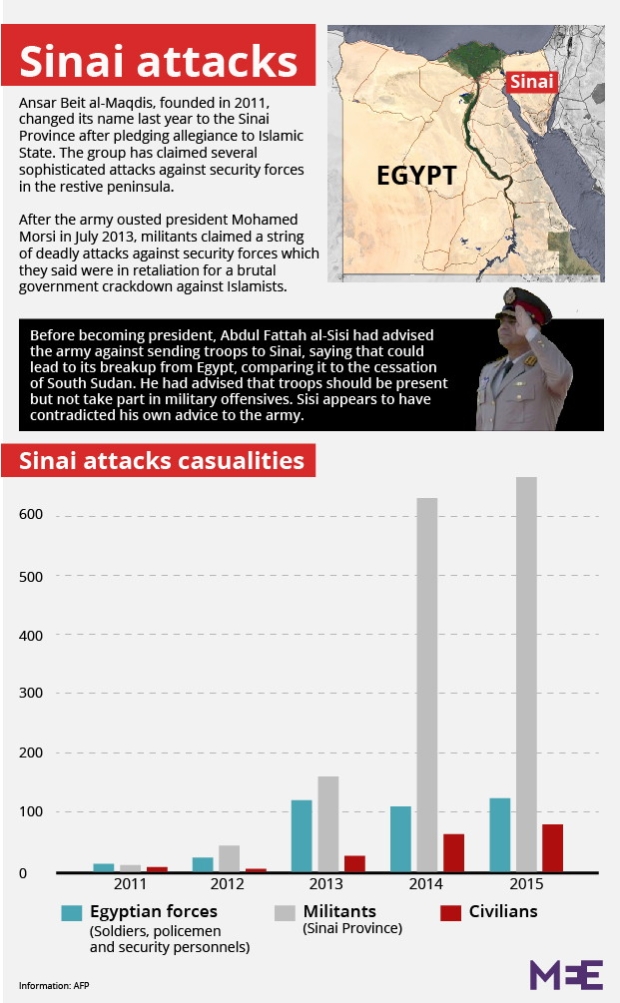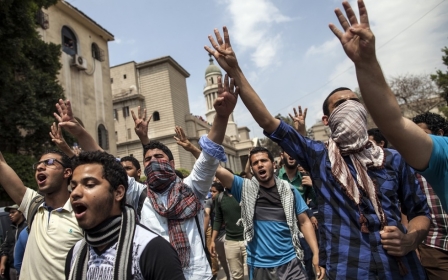Islamic State militants attack Egypt’s Sinai

Surprise attacks carried out by affiliates of Islamic State (IS) militants against Egyptian army positions in Sinai Peninsula on Wednesday have killed at least 70 soldiers and 38 militants, witnesses and officials initially said.
But military officials on Thursday put the death toll at 21 members of the security forces, four of which were officers and the other 17 were soldiers.
The military on Thursday also claimed to have killed over 100 militants, but witnesses told MEE that the figure is inflated, placing the dead militants at somewhere between 20 and 40.
Egypt's military spokesman announced on Thursday that all of Sinai is under army control and that his forces are currently on the hunt for militants.
"People must know that on the ground, these [militants] are like some mice, and nothing more. They are few mercenaries. Whatever their strength and numbers, the armed forces are able to crush them," army spokesman brigadier-general Mohamed Samir told Al Hadath TV.
An unspecified number of civilians and health officials were also killed in the crossfire, as the clashes continued with Egyptian air force F-16 fighter jets pounding IS positions in the town of Sheikh Zuweid. Warplanes resumed strikes against IS positions into the early hours of Thursday, security officials said.
The IS offensive began on Wednesday morning when militants targeted about 15 army checkpoints in simultaneous attacks, as well as the police station in Sheikh Zuweid, Hossam al-Shorbagy, an Istanbul-based Egyptian journalist, told MEE.
'Army vehicles were forced to retreat'
“IS militants took full control of four of the army posts after killing many of the soldiers there. The other positions were attacked with light, medium and heavy weaponry,” said Shorbagy. “Two checkpoints in Sheikh Zuweid were hit by suicide attacks by militants who drove into the military positions, clearing the way for other IS gunmen to shoot at the remaining soldiers.
“The army tried to send reinforcements but as three of their tanks were blown up by IS militants using RPGs and road mines, the army vehicles were forced to retreat [back] to their original positions.”
Most of the soldiers were not killed in direct face-to-face clashes with IS, but by militant rockets and explosives, or after shooting sprees that followed suicide bombings, according to Shorbagy, who cited sources in Sinai.
The army posts consisted mainly of checkpoints at crossroads, manned by 30-40 soldiers backed by three-to-four tanks or armoured vehicles.
Witnesses said Apache helicopters were hovering over Sheikh Zuweid before F16 jets were flown to raid yet unknown positions in Sinai.
The initial delay in airstrikes was thought to be due to the fact that the IS militants were too close to the soldiers.
Egyptian forces had reportedly deserted most of the military checkpoints, but security personnel are still present in the police station.
Police station under siege
“An officer in Sheikh Zuweid police station said that his forces were surrounded by IS militants following the surprise attack,” Muhamed Sabry, an Egyptian journalist based in Sinai, told MEE.
“He could see IS militants sitting in their four-by-four vehicles from his office window inside the police station,” said Sabry, adding that the current siege of the building is not tight and officers can leave the building at will.
“The police officer [who did not wish to be named] confirmed that the surprise attacks were carried out against checkpoints in the town entrance from Al-Arish in the west, and the town’s exit towards Rafah and the southern road towards the villages that have a heavy IS presence like al-Joura and al-Mahdia.”
There were two confirmed civilian fatalities before midday, but the toll is likely to increase - a precise figure remains elusive, as medical staff could not access the troubled zones.
“Three cases reached al-Arish general hospital; two have died from bullet wounds while a third - a woman in her fifties - was shot in the leg,” said Sabry, adding that “the ambulances are in al-Arish and cannot enter Sheikh Zuweid as there are mines in the road.
“Residents remained at home out of fear, and the casualties that were reported came as a result of being caught in the crossfire.”
A bigger army offensive is expected to take place overnight or on Thursday morning as many of the military positions are still under IS control.
“Witnesses say IS militants are parading with their weapons in villages near Sheikh Zuweid,” said Sabry.
“Army checkpoints are almost empty of soldiers. Egyptian forces are currently stationed in al-Joura area, near the international peacekeeping forces, and inside Sheikh Zuweid police station,” he added.
The view from Gaza
Meanwhile Palestinians near the Egyptian border with Gaza woke up to the sound of blasts that shook their houses near Rafah.
“I can see Egyptian troops patrolling their side of the border some 200 metres away. There are two bulldozers that appear to be digging trenches,” Mohammed Omer, a Gaza-based Palestinian journalist, told MEE.
“The Egyptians are installing a new watchtower on the border. We hear an explosion every few minutes but cannot see where it is coming from. In the morning we saw smoke and flames but now we only hear blasts.”
Omer noted that people were relieved with the recent opening of the Rafah crossing and feared the latest development would mean the border would continue to be shut with Egypt.
“The Rafah crossing was opened twice over the past two weeks. The first time for five days and the second for three days, which allowed at least 4,000 people to travel to Egypt.”
Middle East Eye propose une couverture et une analyse indépendantes et incomparables du Moyen-Orient, de l’Afrique du Nord et d’autres régions du monde. Pour en savoir plus sur la reprise de ce contenu et les frais qui s’appliquent, veuillez remplir ce formulaire [en anglais]. Pour en savoir plus sur MEE, cliquez ici [en anglais].





